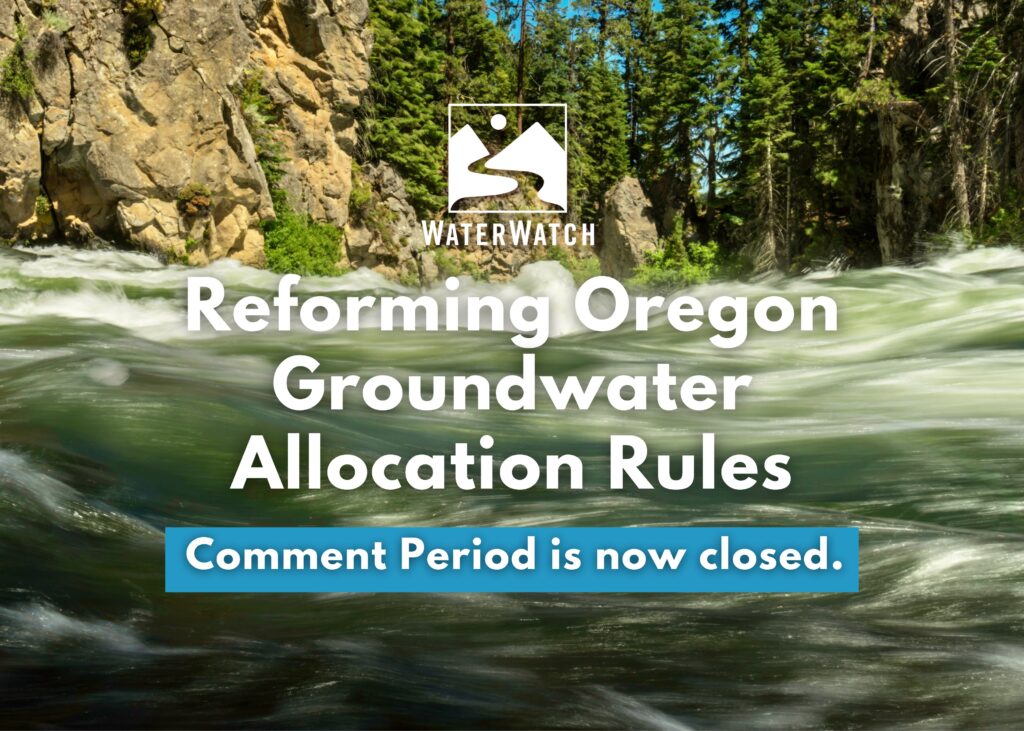May 21, 2024
The public comment period has now closed on this initiative.
If enacted, long-overdue updates to the state’s groundwater allocation rules will begin to rein in Oregon’s decades-long pattern of over-issuing pumping rights, and implement the guidelines of Oregon’s forward-looking, landmark 1955 Ground Water Act, including proposed changes to better account for impacts on surface water, end the practice of “defaulting to yes” to new groundwater rights when the state lacks data to determine whether it had already over-appropriated groundwater in a particular area, and determine whether a proposed new use is within the capacity of a water resource.
Some commercial agricultural and municipal interests are pushing back on the proposed rule updates, so it’s critical for the state hear from water advocates and Oregonians like you who support Oregon’s sustainable groundwater future.
Email your remarks to the Oregon Water Resources Department at wrd_dl_rule-coordinator@water.oregon.gov, or mail them to:
Laura Hartt
Oregon Water Resources Department
725 Summer St. NE, Suite A
Salem, OR 97301
If you’re mailing a letter be sure your comments are received — not just postmarked — by this Friday, June 14th.
Also this Friday the 14th, the state Water Resources Commission (WRC) will hear an informational report from OWRD staff on the groundwater allocation rulemaking process at this week’s WRC meeting in Bend.
The WRC is accepting written comments for Friday’s meeting, so if you have remarks you’re going to send, or have already sent to OWRD, you can submit them to the WRC as well.
Talking Points
When submitting remarks or writing a letter it’s always best to write in your own words, but feel free to utilize some or all of the talking points here and below to make your argument in support of the OWRD’s proposed groundwater allocation rule revisions. Related articles are linked further down the page.
- The new rules will result in more sustainable management of Oregon’s groundwater.
- The new rules will ensure better protection of streamflows and cold water inputs to Oregon rivers and streams from the impacts of over-pumping hydraulically-connected groundwater.
- Challenges associated with the impacts of climate change make it even more important for the state to stop over-issuing groundwater permits.
- The new rules will end the practice of “defaulting to yes” to new groundwater rights when the state lacks data to determine whether it has already over-appropriated groundwater in a particular area, and whether a proposed new use is within the capacity of a water resource.
- The method by which Oregon issues new groundwater permits has long been in need of an overhaul, and I look forward to the adoption of the proposed rules.
Groundwater Sustainability
For decades, Oregon’s existing rules for issuing new groundwater permits have resulted in an over-issuance of groundwater permits, and have caused major groundwater level declines across the state that harm rivers, streams, lakes, wetlands and springs that rely upon inputs of cold, clean groundwater. Declining groundwater levels have also harmed existing surface water rights, including instream water rights, and domestic well owners who rely on groundwater for drinking water and household use.
To be clear, new allocation rules would apply to new groundwater permits only. They would not apply to, say, exempt domestic wells. The new rules will also:
- Define “reasonably stable” groundwater levels and prevent new groundwater permits from being issued when groundwater levels are not reasonably stable.
- Establish the amount and type of data needed to determine whether groundwater levels are reasonably stable — and require denial of a permit application if that data is not available.
- Protect senior surface water rights — including instream water rights — by requiring a full accounting of the impacts of proposed pumping on hydraulically connected rivers and streams (i.e., the physical connection and interaction of streams and waterways throughout a river network). This marks an important improvement, as the state’s practice over the last several decades has resulted in an issuance of groundwater permits that has injured senior surface water rights.
Again, ensure your comments to OWRD are received by 5 p.m. this Friday, June 14th. You can submit them via email or at the mailing address above.
Additional Resources
The need for revised groundwater allocation rules are also included in letters from both WaterWatch of Oregon and the Oregon Water Partnership delivered to the Oregon Water Resources Commission ahead of that agency’s Nov. 17th, 2023, meeting that featured a “groundwater allocation rulemaking update” presentation.
The spring 2024 issue of Instream includes WaterWatch’s most recent article on OWRD’s overhaul of groundwater allocation rules. Read the article here.
The spring 2022 issue of Instream was entirely dedicated to groundwater issues. You can view the entire PDF of the issue here, or visit these articles individually:
- Groundwater Over-Allocation in Oregon: the Deschutes, Umatilla, Klamath and Harney Basins
- State Groundwater Management, Capacity and Investment: A Transformative Package
- Urgent Groundwater Reforms Needed for a Sustainable Water Future
- Protecting Groundwater Resources is Critical for Oregon’s Environment and People
- Groundwater: Oregon’s Future Depends On It


